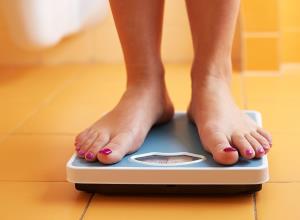 © Shutterstock Step on scale
© Shutterstock Step on scale
There are a lot of different studies that show you tips and tricks to lose weight. One study shows that sleeping for 15 minutes more than usual can help with weight loss. Another study says that eating breakfast within 30 minutes of waking up can help you lose weight. And now this study, published by the American Heart Association Journals in 2018, states that getting on the scale every day may be the key to weight loss.
This 12-month study tracked 1,042 adults and their weigh-ins over the course of the year. The results stated that those who weighed themselves once a week or even less than that did not lose weight, while those who weighed themselves six or seven times a week averaged a 1.7% weight loss.
The reason behind the success of those who had persistent daily weigh-ins was due to self-monitoring. According to a study published by the Journal of Academy of Nutrition and Dietetics, self-monitoring is an important aspect of behavioral weight loss intervention programs. In their studies, they found that a “significant association between self-monitoring and weight loss was consistently found.” While these studies were all based on self-reports (which can create room for error), there is consistently a successful link when a person focuses on daily self-monitoring for their weight loss efforts. (If you’re looking to create more healthy habits, check out our list of 21 Best Healthy Cooking Hacks of All Time.)
By administering a daily practice of getting on the scale, a consistent habit of eating a good diet and losing weight soon followed for these participants. Plus, getting on the scale on a regular basis can help a person understand their bodies. Weight fluctuation is normal even on a daily basis, especially if there are changes in your diet, fluid intake and alcohol consumption, hormone levels, activity level, illness, and more. Even women experience slight weight gain as they go through their menstrual cycle. Getting on the scale can be helpful to understand your body on a deeper, scientific level.
However, it’s also important to note that for some, getting on the scale daily can create an unhealthy obsession, which doctors are quick to point out. If getting on the scale on a regular basis does not do well for your mental health, it can be useful to find other ways that create self-monitoring in your life. How do you feel? How do your clothes fit? Are there foods that make your body feel good or leave you feeling bloated and depleted of energy?
Overall, a focus on diet and weight is a focus on overall health and feeling better in your body. If self-monitoring with a scale is useful for your weight loss efforts and holds you accountable for reaching your goals, make it a part of your daily routine. If it isn’t helpful, find other ways of self-monitoring that feel good for your personal goals and your health. And if you can’t find specific things that work for you, talking to a doctor or a registered dietitian is always the best way to get started.
For even more weight loss tips, be sure to sign up for our newsletter.
Read the original article on Eat This, Not That!



